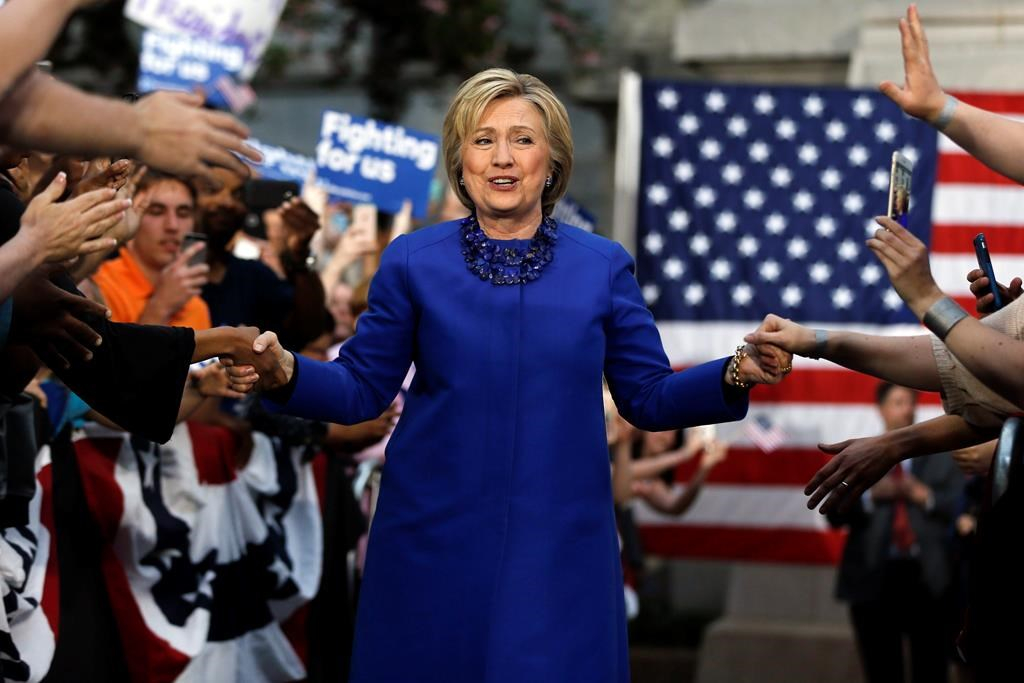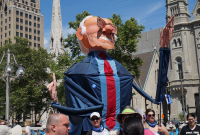Support strong Canadian climate journalism for 2025
Hillary Clinton was determined to go skating.
The First Lady, as she was called when she came to Ottawa on a February 1995 state visit with then-U.S. president Bill Clinton, had often heard about the Rideau Canal, but never had the chance to glide along its surface like so many visitors and locals.
Word had leaked out to the media, however, and the U.S. Secret Service wanted to shut it down.
Gordon Giffin, who became the American ambassador to Canada two years later, still has a vivid memory of her reaction.
"She just stood there with her ice skates that she'd personally brought with her on Air Force One," Giffin told The Canadian Press in an interview.
"She said, 'I brought my skates. I'm going to skate. My security is your problem,'" he said.
"That may be a small thing to people, but how many people who've lived in the White House do you think have ever heard of the Rideau Canal and would recognize that you skate there? That's an intensity of knowledge and affinity for Canada."
It is nothing new or extraordinary for an American politician to speak fondly of Canada as a trading partner and friend on the other side of the long and peaceful border. But Clinton, who is hoping to return to the White House this fall — this time as president — has ties that run deeper than most.
Her maternal grandmother, Della Martin, came from a large family that had French-Canadian roots, Clinton wrote in her 2003 memoir, Living History.
The book does not go into any more detail about this particular branch of her ancestral tree, perhaps because, as she went on to write, Clinton's mother was "essentially" abandoned by the woman when she was a small girl.
That has not stopped others from following that thread, including Gail Moreau-Desharnais of the French-Canadian Heritage Society of Michigan, who has traced Clinton's genealogical roots to ancestors in common with Prime Minister Justin Trudeau, and his father too, of course.
They go back, in fact, all the way to a woman named Jeanne Ducorp, sometimes known by the surname Leduc.
She was one of the so-called King's Daughters (or Filles du Roy) — hundreds of women who arrived in New France, sponsored by Louis XIV, to help strengthen the colony that was at that time sparsely populated by single men — and married a man named Martin Masse around 1670 in Sorel, Que.
There are other early connections Clinton has embraced warmly.
"I have had a lot of great trips to Canada long before I was ever in public life and have always been so appreciative of the gracious hospitality," Clinton said during a 2010 visit to Ottawa when she was U.S. secretary of state.
One of those trips, she said, included a drive up the Alaska Highway before it was paved.
In Living History, Clinton recalls travelling to Vancouver and Victoria, B.C., with Bill Clinton and their daughter, Chelsea, who was then 11 years old, for a short vacation in the summer of 1991 to discuss whether her husband should run for president.
She was also in Ottawa in 1999 — shortly after beginning her successful campaign for the U.S. Senate in New York — to dedicate a sculpture by artist Joel Shapiro in front of the new U.S. embassy building on Sussex Drive.
And while she hosted many state dinners at the White House as First Lady, the first she attended was in 1977, when a newly inaugurated president Jimmy Carter feted guests of honour Pierre Elliott Trudeau, then Canadian prime minister, and his wife, Margaret.
Former U.S. ambassador David Jacobson, whose time in Ottawa overlapped with Clinton's tenure as secretary of state, concedes he was anxious about their relationship. That's because, as deputy finance chairman for U.S. President Barack Obama's Democratic primary campaign, he spent two years of his life doing what he could to make sure she would not become the presidential nominee.
But any hard feelings that may have lingered were put aside, Jacobson said in an interview.
"She could not have been nicer or kinder towards me," he said.
One kindness came when Clinton helped him out of a typically Canadian bind.
He had gone back to his hometown of Chicago in December 2010, and a major blizzard prevented him from being able to fly back to Ottawa, where he was expecting to attend a meeting of North American foreign ministers in Wakefield, Que.
Jacobson said Clinton asked him to get to Washington, where flights were still landing, and she gave him a lift on her U.S. Air Force plane.
There are other Canadian connections her political opponents have used to attack her integrity.
Last year, an unflattering book about the Clinton family finances — dismissed as riddled with errors and innuendo by the Clinton campaign — raised questions about their relationship with Frank Giustra, a Vancouver-based mining magnate and philanthropist behind the Clinton Giustra Enterprise Partnership, an initiative of the Clinton Foundation, and a Canadian charity that bears the same name.
The book alleged a link between the charitable contributions and lucrative contracts awarded to his uranium-mining company, which Giustra has vigorously denied.
Jacobson said Clinton, as secretary state, believed Canada had a special role to play.
"The role that she perceived Canada playing was a partner of the United States to reinforce our values elsewhere around the world," said Jacobson, who believes she would bring that same perspective on the country should she become president.
Jacobson predicted the warm relationship that Obama shares with Trudeau would continue with Clinton as U.S. leader.
"I know them both and my guess is they're going to get along very well."
— With files from Alexander Panetta



Comments